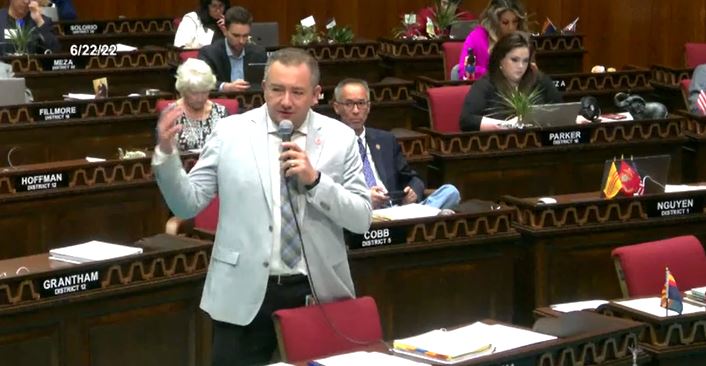
by Daniel Stefanski | Apr 3, 2024 | News
By Daniel Stefanski |
Many current or aspiring public servants submitted signatures to make the ballot for the upcoming 2024 election in Arizona.
Over the past weeks, men and women running for office across all jurisdictions in Arizona finalized their petition signature gathering and turned in their offerings to meet the deadline.
Maricopa County Attorney Rachel Mitchell, a Republican, announced that she had turned in 8,941 signatures. She said, “Your dedication and enthusiasm have truly blown me away, and I’m so grateful for the overwhelming support from our community. It’s because of amazing folks like you that I get to keep fighting the good fight—upholding the rule of law and keeping our communities safe in Maricopa County.”
State Senator Justine Wadsack, a Republican revealed that she had filed 1,381 signatures. She wrote, “I have officially qualified for the 2024 ballot! We collected more than twice the required signatures & maxed out the verified Equal! Thanks to my PC’s hard work, we had another year of organic circulation & not a single paid signature!”
Justin Heap, a Republican running for Maricopa County Recorder, shared that he had acquired over 8,000 signatures in fewer than 30 days since he entered that race. Heap said, “I’m humbled by the overwhelming outpouring of support from voters across the County.”
Kevin Volk, a Democrat attempting to win a seat in the Arizona House of Representatives in Legislative District 17, filed 2,138 signatures in his quest to win an election. He shared that he “was able to meet many of the people who signed at their homes, [and that] the rest signed thanks to an incredible grassroots volunteer effort.”
Senate President Pro Tempore T.J. Shope thanked the 1,000+ people who signed his petition for reelection to the chamber in Legislative District 16. He stated that he “won’t let you down in our fight to keep our Arizona values at the State Senate!”
Ylenia Aguilar, a Democrat challenger for the Arizona Corporation Commission, filed her signatures to qualify for the ballot. She noted the support of individuals around the state who assisted her with this campaign achievement, writing, “This wouldn’t have been possible without the incredible dedication & hard work of our volunteers.”
Two other Democrats running for the Arizona Corporation Commission also turned in their signatures in March – Jonathon Hill and Joshua Polacheck.
Mark Stewart, a Republican running for Maricopa County Board of Supervisors in District One, proudly unveiled his signature totals, which amounted to over 2,300 after a second batch. He thanked his “dedicated volunteers for [their] tireless efforts in gathering thousands of signatures, and [his] family for their unwavering patience and support.”
Shane Krauser, a candidate for the open position for Gilbert Mayor, also announced that he had filed enough signatures to qualify for the ballot.
The Arizona Primary Election will be on Tuesday, July 30, 2024. Winners of their respective party elections will move on to the pivotal General Election in November, which will have huge implications for the state and the nation.
Daniel Stefanski is a reporter for AZ Free News. You can send him news tips using this link.

by Daniel Stefanski | Apr 3, 2024 | News
By Daniel Stefanski |
A Republican-led bill to help protect the Arizona electric grid from a lethal threat was recently signed into law.
Late last month, Governor Katie Hobbs signed SB 1301, which “requires electricity producers in Arizona to take steps to secure a continuous supply of electricity regarding the threat of an electromagnetic pulse” – according to the purpose from the State Senate. The proposal was sponsored by Senator David Farnsworth.
In a statement to mark the successful conclusion of his legislation, Farnsworth said, “A few years ago, I was made aware of the danger of electromagnetic pulse. This phenomenon occurs as a burst of electromagnetic energy that can shut down all our electricity in a matter of seconds. That means all transportation, forms of communication, refrigeration, etc., needed to live and operate as a society, will cease to exist. This can occur as a result of a natural event in the form of a solar storm, or a man-made weapon such as a nuclear bomb or electromechanical device.”
The Republican Senator added, “If you want to know more about this phenomenon, I recommend watching a documentary called Grid Down, Power Up, which further explains these dangers and possible solutions.”
The bill unanimously passed the Senate Committee on Natural Resources, Energy and Water with a 7-0 vote in February. It was then cleared by the full Senate chamber that same month with a 29-0 vote (with one member not voting). After being transmitted to the State House of Representatives, the legislation was approved by the Committee on Natural Resources, Energy & Water in March with a 9-1 vote. It then sailed past the final legislative hurdle, passing the full House chamber with a 48-8 vote (with three members not voting and one seat vacant).
Senators Shawnna Bolick, Sonny Borrelli, Wendy Rogers, Justine Wadsack, and Representative Seth Blattman were co-sponsors of the bill.
SB 1301 will go into effect 90 days after the Arizona Legislature adjourns for the 2024 session.
Daniel Stefanski is a reporter for AZ Free News. You can send him news tips using this link.

by Daniel Stefanski | Apr 2, 2024 | News
By Daniel Stefanski |
Arizona legislative Republicans are racking up a lengthy list of legal cases on behalf of the state.
Earlier this month, the Arizona Senate Republicans Caucus’ “X” account posted an update on the lawsuits that President Warren Petersen and House Speaker Ben Toma have engaged in due, in large part, to the absence of the state’s Democrat attorney general. The collective voice for the Senate Republicans wrote, “Your Arizona Republican state lawmakers don’t shy away from joining legal battles when your freedoms, safety, and our democracy are on the line! We’ve joined a number of impactful cases and are now paving the way for other state legislatures to do the same.”
Per the Senate Republicans, the issues covered by the legal challenges include the following: election integrity, religious freedom, First Amendment rights, Second Amendment rights, the homeless crisis, keeping men out of women’s safe spaces, government overreach, and medical freedom.
There were several updates on cases that the Arizona Senate Republicans have weighed in on behalf of state residents. In AZ Senate v. Hobbs – a case involving a dispute over the governors’ retraction of agency director nominations – “oral arguments on cross motions for summary judgment is set for April 26, 2024.” Late last year, legislative Republicans sued Governor Katie Hobbs over this issue.
In Johnson v. City of Grants Pass – a case involving a challenge to a local government’s policy against a homeless encampment – “the U.S. Supreme Court accepted review of the case and set oral argument for April 22, 2024.” Legislative Republicans wrote an amicus brief to the nation’s high court in support of the City of Grants Pass’ position.
In a challenge over the constitutionality of Arizona’s Save Women’s Sports Act, “the Ninth Circuit [had] set oral argument in [the] appeal of the trial court’s preliminary injunction ruling for March 14, 2024.” Legislative Republicans had intervened in the case to help defend the law that was passed to protect the integrity of women’s sports.
In Murthy v. Missouri, “oral argument [was] scheduled at the U.S. Supreme Court on March 18, 2024.” The Legislature had joined with over a dozen states on an amicus brief in support of Missouri’s fight against the federal government over online censorship.
Not only have Arizona Republican legislators been active in intervening on cases that impact laws or interests of their state, but they have increasingly shown an appetite for joining briefs and letters that have been led by Republican state attorneys general around the country. While not unprecedented, those actions have been extremely rare in the past – until recently, when the Arizona Legislature, led by Petersen and Toma, have signed onto multiple actions in federal court. More of these efforts are expected as the year continues.
Daniel Stefanski is a reporter for AZ Free News. You can send him news tips using this link.

by Elizabeth Troutman | Apr 2, 2024 | News
By Elizabeth Troutman |
A Phoenix police officer was shot several times on March 29 at approximately 11:30 p.m. Police detectives are investigating the shooting of the officer, a husband and father who has been with the department for seven years.
Maricopa County Attorney General Rachel Mitchell said she is praying for the officer.
“Praying for the swift and complete healing of the officer,” she said on X.
Phoenix Mayor Kate Gallego did not comment on the shooting.
Multiple suspects attempted an armed robbery of a vehicle in a parking lot when a Phoenix Police Department officer, working in an off-duty capacity at a nearby business, was notified.
After the officer approached the area, at least one of the suspects, armed with a handgun, began to fire in the direction of the officer.
The officer suffered multiple gunshot wounds. He did not fire his firearm during this incident. The suspects left the area before additional officers arrived.
The officer remains hospitalized in stable condition.
Investigators are continuing to search the area where the incident occurred for surveillance videos from nearby businesses. Anyone who was in the area at the time of the incident are urged to reach out to police.
Interim Phoenix Police Chief Michael Sullivan has a message for the suspects.
“I’m going to encourage the folks who were involved in this incident to turn themselves in,” Sullivan said at a news briefing Saturday morning. “We will not rest, we will not stop until we hold them to account for their crimes to the fullest extent of the law.”
Elizabeth Troutman is a reporter for AZ Free News. You can send her news tips using this link.

by Daniel Stefanski | Apr 1, 2024 | News
By Daniel Stefanski |
Arizona legislative Republicans have come up with a new way to hold Democrat state officials accountable to the rule of law.
On Tuesday, the Arizona House Republicans Caucus announced that the House Ad Hoc Committee on Executive Oversight had been created. The new committee will “scrutinize the practices of the Arizona Attorney General and other state officials, specifically to investigate allegations of the abuse of power, dereliction of duty, and/or malfeasance.”
According to the press release issued by Arizona House Republicans, the committee will be “tasked with developing recommendations for potential legislative action and other measures to promote the rule of law and deter partisan abuse and weaponization of the office of Arizona Attorney General or other state offices.”
House Speaker Ben Toma created the committee and released the following statement in conjunction with the legislative announcement: “The Arizona House of Representatives has an inherent obligation under the Arizona Constitution to conduct appropriate oversight of officers in the Executive branch to protect the rule of law and the separation of powers. I established this Committee because the public and members of the House have raised serious concerns suggesting that Arizona Attorney General Kris Mayes has engaged in a pattern of malfeasance in office. It is critical that this Committee fully investigate those allegations, thoroughly review Arizona laws, and solicit more information as necessary to advise the House on any and all appropriate measures that should be taken.”
The press release from the Speaker revealed that State Representative Jacqueline Parker would “serve as chairman of the committee.” Parker is also the chair of the Committee on Municipal Oversight and Elections; she will be maintaining that role.
In acknowledgement of her appointment, Parker said, “Attorney General Mayes has refused to defend state laws in court, harassed parents who have elected to use the ESA program to educate their children, threatened elected county officials with illegitimate prosecutions, and diverted funds and resources of her office to serve her own partisan purposes that are not authorized by the Legislature or state law. These are among the allegations that I expect the Ad Hoc Committee will thoroughly investigate.”
The five Republican State Representatives who will serve on this committee were already named: Parker, Austin Smith (Vice Chair), John Gillette, Neal Carter, and David Marshall. There are three vacancies for Democrats on the committee; those positions are expected to be named at a future date.
Representative Smith weighed in on his new assignment, writing, “As Vice Chairman of the Ad Hoc Committee on Executive Oversight, it is imperative that the legislature exercise its constitutional authority as a check on the executive branch. We have heard from many concerned citizens that Kris Mayes recent behavior is unwarranted, weaponized and partisan. We will thoroughly investigate potential partisan activity in the Attorney Generals office for the protection of this Constitutional Republic.”
Daniel Stefanski is a reporter for AZ Free News. You can send him news tips using this link.

by Daniel Stefanski | Apr 1, 2024 | News
By Daniel Stefanski |
An Arizona Republican State Senator is pushing back against a new regulation from the U.S. Securities and Exchange Commission.
Last week, Senator Shawnna Bolick added her name to a letter addressed to Members of the U.S. Congress over the SEC’s “radical climate agenda rule that would require most public companies to disclose their greenhouse gas emissions in order to be listed on American stock exchanges.” The letter was sent by a coalition of leaders under the umbrella of Advancing American Freedom.
On her “X” account, Bolick wrote, “It is always an honor to push back against Biden’s job killing policies.”
The signers of the letter requested legislators to “use all of the legislative powers at your disposal to strike down the SEC’s climate disclosure rule, including defunding the rule via the appropriations process and overturning it through the Congressional Review Act resolution effort being led by Congressman Bill Huizenga and Senator Tim Scott.”
In the letter, the coalition of organization heads highlighted that “American investors are concerned with financial returns and increasing shareholder value, not advancing an ideological climate agenda that stifles American innovation through mountains of paperwork and endless red tape for the American businesses that keep our economy strong.”
They noted that almost two dozen states have challenged the rule from the SEC. Iowa Attorney General Brenna Bird, who led one of the lawsuits, said, “Biden’s radical climate mandate is the most outrageous act of overreach we’ve seen from the Securities and Exchange Commission since Biden took office. The SEC is supposed to prevent people from getting ripped off, not force an illegal climate mandate that is far outside of their wheelhouse. His climate mandate will only saddle businesses with costly red tape, threaten our supply chain, and devastate Iowa family farms.”
The Arizona Senate Democrats Caucus “X” account took aim at Bolick’s involvement in the letter, posting, “Just to clarify Senator Bolick, which policy are you pushing back against? Historically low unemployment, under 4% for two full years. Nearly 15 million new jobs added under President Biden. Inflation is down nearly 2/3 from its peak. In 2023, the economy grew 3.1%.”
Additional signers of the letter included leaders from Americans for Tax Reform, Americans for Prosperity, Consumers’ Research, American Commitment, 60 Plus Association, National Taxpayers Union, American Energy Institute, Competitive Enterprise Institute, Job Creators Network, and several others.
Daniel Stefanski is a reporter for AZ Free News. You can send him news tips using this link.






